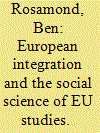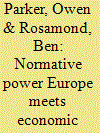|
|
|
Sort Order |
|
|
|
Items / Page
|
|
|
|
|
|
|
| Srl | Item |
| 1 |
ID:
076523


|
|
|
|
|
| Publication |
2007.
|
| Summary/Abstract |
This article takes the 50th anniversary of the Treaty of Rome as an opportunity to reflect upon half a century of academic discourse about the EU and its antecedents. In particular, it illuminates the theoretical analysis of European integration that has developed within political science and international studies broadly defined. It asks whether it is appropriate to map, as might be tempting, the intellectual `progress' of the field of study against the empirical evolution of its object (European integration/the EU). The argument to be presented here is that while we can, to some extent, comprehend the evolution of academic thinking about the EU as a reflex to critical shifts in the `real world' of European integration (`externalist' drivers), it is also necessary to understand `internalist' drivers of theoretical discourse on European integration/the EU. The article contemplates two such `internalist' components that have shaped and continue to shape the course of EU studies: scholarly contingency (the fact that scholarship does not proceed with free agency, but is bound by various conditions) and disciplinary politics (the idea that the course of academic work is governed by power games and that there are likely significant disagreements about best practice and progress in a field). In terms of EU studies, the thrust of disciplinary politics tends towards an opposition between `mainstreaming' and `pluralist versions' of the political science of EU studies. The final section explores how, in the face of emerging monistic claims about propriety in the field, an effective pluralist political science of the EU might be enhanced.
|
|
|
|
|
|
|
|
|
|
|
|
|
|
|
|
| 2 |
ID:
126798


|
|
|
|
|
| Publication |
2013.
|
| Summary/Abstract |
In a recent piece in this journal Jørgensen and Valbjørn develop a typology of intellectual dialogue across fields that yields rather negative conclusions about the prospects for sustainable dialogue between 'European studies' and the 'new regionalism'. This response disputes this pessimistic conclusion. First, it is argued that while their derivation of models of dialogue is impressive, it is nonetheless incomplete. Using Jørgensen and Valbjørn's premises, the article derives a 'market' mode of dialogue that represents a challenge to their assumption that dialogue will tend towards hierarchy. Second, the article accepts that there are important 'sociology of knowledge' impediments to effective dialogue within political science and International Relations, but maintains that Jørgensen and Valbjørn fail to work through the question of 'dialogue between whom?' The article argues that methodological division is the most significant impediment to dialogue, but maintains that within-methodology dialogue is more than viable in the case under scrutiny in this debate. Third, having established these general parameters of disagreement, the article moves to a number of more particular criticisms of the assumptions made by Jørgensen and Valbjørn about extant calls for dialogue between scholars in these two fields.
|
|
|
|
|
|
|
|
|
|
|
|
|
|
|
|
| 3 |
ID:
120738


|
|
|
|
|
| Publication |
2013.
|
| Summary/Abstract |
This article offers a reading of 'normative power Europe' (NPE) suggesting that the concept has been used for two distinct purposes: as a distinctive ontological characterisation of the EU, on the one hand, and as a critical approach to the study of the EU and its external projection, on the other. These positions are labelled 'NPE ontological reality' (NPE-OR) and 'NPE critical ontology' (NPE-CO), respectively, and this article sets out to show how they might work together in practice, even if they are incommensurable in theory. It is argued that NPE's ethico-political value resides in the extent that it embodies an ontologically plural reality, never entirely defined. By drawing attention to a blind-spot in the NPE position - the constitutive importance of economic liberalism ('market cosmopolitanism') to the EU's post-Westphalian character - attention is drawn to the normative basis of market cosmopolitanism and its connections to NPE-OR are described. It is argued that, from an NPE-CO perspective, we should exercise caution in celebrating NPE-OR as post-Westphalian reality to the extent that it is rooted in a market cosmopolitics.
|
|
|
|
|
|
|
|
|
|
|
|
|
|
|
|
| 4 |
ID:
049054


|
|
|
|
|
| Publication |
London, Routledge, 1997.
|
| Description |
xi, 532p.
|
| Standard Number |
0415110750
|
|
|
|
|
|
|
|
|
|
|
|
Copies: C:1/I:0,R:0,Q:0
Circulation
| Accession# | Call# | Current Location | Status | Policy | Location |
| 039719 | 320/AXF 039719 | Main | On Shelf | General | |
|
|
|
|
|
|
|
|
|